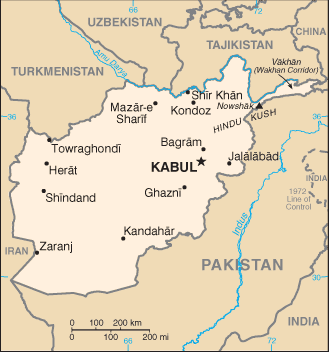In comments this weekend, Afghan President Hamid Karzai accused Pakistan of staging the cross-border clashes with Afghan police as a way to force the Afghan government to formally discuss borders, something that they have repeatedly refused to do.
 Karzai insists that the incident, which killed an Afghan border policeman and wounded two Pakistani soldiers, should convince the Taliban to stop resisting his government and “turn their weapons against the enemies of their properties,” i.e. Pakistan.
Karzai insists that the incident, which killed an Afghan border policeman and wounded two Pakistani soldiers, should convince the Taliban to stop resisting his government and “turn their weapons against the enemies of their properties,” i.e. Pakistan.
The border issue is a complicated one. The border between Afghanistan and Pakistan was established during the British Raj, and established in 1893. Though Afghan governments repeatedly reaffirmed the border, notably in the Treaty of Rawalpindi, ending the third British war against Afghanistan.
The problem arises when Pakistan was carved out of the Raj in 1947, and took over the border regions. Pakistan has argued for the past 66 years that no new agreement was needed and that they just inherited the British deal. Britain has also affirmed that belief.
Afghan officials have insisted that the 1893 deal was under duress and that they don’t recognize the border as binding. The Taliban government refused to endorse the border in 2001, and Karzai has insisted that the Afghan people will “never” be willing to do so.
In practice this is meaningless right now, since Afghanistan doesn’t have the ability to control its own side of the border, let alone reclaim “lost” territory from the early 19th century militarily from Pakistan. In theory, however, Afghans continue to insist that much of Pakistan, including the provinces of Balochistan, Khyber-Pakthunkhwah and the Federally Administered Tribal Areas (FATA) are their territory.


